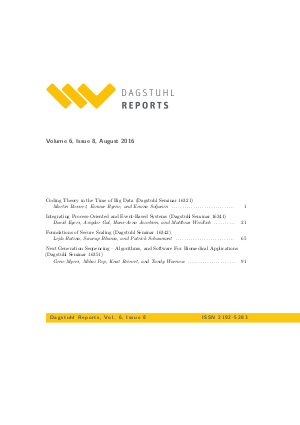Dagstuhl Reports, Volume 6, Issue 8
-
Part of:
Volume:
Dagstuhl Reports, Volume 6
Journal: Dagstuhl Reports (DagRep)

Event
- Dagstuhl Seminars 16321, 16341, 16342, 16351
Publication Details
- published at: 2017-01-27
- Publisher: Schloss Dagstuhl – Leibniz-Zentrum für Informatik
- DBLP: db/journals/dagstuhl-reports/dagstuhl-reports6
Access Numbers
- Detailed Access Statistics available here
-
Total Document Accesses (updated on a weekly basis):
0PDF Downloads
Documents
Dagstuhl Reports, Volume 6, Issue 8, August 2016, Complete Issue
Abstract
Cite as
Dagstuhl Reports, Volume 6, Issue 8, Schloss Dagstuhl – Leibniz-Zentrum für Informatik (2017)
Copy BibTex To Clipboard
@Article{DagRep.6.8,
title = {{Dagstuhl Reports, Volume 6, Issue 8, August 2016, Complete Issue}},
journal = {Dagstuhl Reports},
ISSN = {2192-5283},
year = {2017},
volume = {6},
number = {8},
publisher = {Schloss Dagstuhl -- Leibniz-Zentrum f{\"u}r Informatik},
address = {Dagstuhl, Germany},
URL = {https://drops.dagstuhl.de/entities/document/10.4230/DagRep.6.8},
URN = {urn:nbn:de:0030-drops-69170},
doi = {10.4230/DagRep.6.8},
annote = {Keywords: Dagstuhl Reports, Volume 6, Issue 8, August 2016, Complete Issue}
}
Dagstuhl Reports, Table of Contents, Volume 6, Issue 8, 2016
Abstract
Cite as
Dagstuhl Reports, Volume 6, Issue 8, pp. i-ii, Schloss Dagstuhl – Leibniz-Zentrum für Informatik (2017)
Copy BibTex To Clipboard
@Article{DagRep.6.8.i,
title = {{Dagstuhl Reports, Table of Contents, Volume 6, Issue 8, 2016}},
pages = {i--ii},
journal = {Dagstuhl Reports},
ISSN = {2192-5283},
year = {2017},
volume = {6},
number = {8},
publisher = {Schloss Dagstuhl -- Leibniz-Zentrum f{\"u}r Informatik},
address = {Dagstuhl, Germany},
URL = {https://drops.dagstuhl.de/entities/document/10.4230/DagRep.6.8.i},
URN = {urn:nbn:de:0030-drops-69164},
doi = {10.4230/DagRep.6.8.i},
annote = {Keywords: Dagstuhl Reports, Table of Contents, Volume 6, Issue 8, 2016}
}
Coding Theory in the Time of Big Data (Dagstuhl Seminar 16321)
Abstract
Cite as
Martin Bossert, Eimear Byrne, and Emina Soljanin. Coding Theory in the Time of Big Data (Dagstuhl Seminar 16321). In Dagstuhl Reports, Volume 6, Issue 8, pp. 1-20, Schloss Dagstuhl – Leibniz-Zentrum für Informatik (2016)
Copy BibTex To Clipboard
@Article{bossert_et_al:DagRep.6.8.1,
author = {Bossert, Martin and Byrne, Eimear and Soljanin, Emina},
title = {{Coding Theory in the Time of Big Data (Dagstuhl Seminar 16321)}},
pages = {1--20},
journal = {Dagstuhl Reports},
ISSN = {2192-5283},
year = {2016},
volume = {6},
number = {8},
editor = {Bossert, Martin and Byrne, Eimear and Soljanin, Emina},
publisher = {Schloss Dagstuhl -- Leibniz-Zentrum f{\"u}r Informatik},
address = {Dagstuhl, Germany},
URL = {https://drops.dagstuhl.de/entities/document/10.4230/DagRep.6.8.1},
URN = {urn:nbn:de:0030-drops-68370},
doi = {10.4230/DagRep.6.8.1},
annote = {Keywords: Algebraic coding theory, Caching problems, Coding theory, Complexity theory, Cryptography, Distributed storage, Error-correction, Index coding, Information theory, Randomized algorithms, Streaming algorithms}
}
Integrating Process-Oriented and Event-Based Systems (Dagstuhl Seminar 16341)
Abstract
Cite as
David Eyers, Avigdor Gal, Hans-Arno Jacobsen, and Matthias Weidlich. Integrating Process-Oriented and Event-Based Systems (Dagstuhl Seminar 16341). In Dagstuhl Reports, Volume 6, Issue 8, pp. 21-64, Schloss Dagstuhl – Leibniz-Zentrum für Informatik (2017)
Copy BibTex To Clipboard
@Article{eyers_et_al:DagRep.6.8.21,
author = {Eyers, David and Gal, Avigdor and Jacobsen, Hans-Arno and Weidlich, Matthias},
title = {{Integrating Process-Oriented and Event-Based Systems (Dagstuhl Seminar 16341)}},
pages = {21--64},
journal = {Dagstuhl Reports},
ISSN = {2192-5283},
year = {2017},
volume = {6},
number = {8},
editor = {Eyers, David and Gal, Avigdor and Jacobsen, Hans-Arno and Weidlich, Matthias},
publisher = {Schloss Dagstuhl -- Leibniz-Zentrum f{\"u}r Informatik},
address = {Dagstuhl, Germany},
URL = {https://drops.dagstuhl.de/entities/document/10.4230/DagRep.6.8.21},
URN = {urn:nbn:de:0030-drops-69108},
doi = {10.4230/DagRep.6.8.21},
annote = {Keywords: distributed systems, event-based systems, process-aware information systems}
}
Foundations of Secure Scaling (Dagstuhl Seminar 16342)
Abstract
Cite as
Lejla Batina, Swarup Bhunia, Patrick Schaumont, and Jean-Pierre Seifert. Foundations of Secure Scaling (Dagstuhl Seminar 16342). In Dagstuhl Reports, Volume 6, Issue 8, pp. 65-90, Schloss Dagstuhl – Leibniz-Zentrum für Informatik (2017)
Copy BibTex To Clipboard
@Article{batina_et_al:DagRep.6.8.65,
author = {Batina, Lejla and Bhunia, Swarup and Schaumont, Patrick and Seifert, Jean-Pierre},
title = {{Foundations of Secure Scaling (Dagstuhl Seminar 16342)}},
pages = {65--90},
journal = {Dagstuhl Reports},
ISSN = {2192-5283},
year = {2017},
volume = {6},
number = {8},
editor = {Batina, Lejla and Bhunia, Swarup and Schaumont, Patrick and Seifert, Jean-Pierre},
publisher = {Schloss Dagstuhl -- Leibniz-Zentrum f{\"u}r Informatik},
address = {Dagstuhl, Germany},
URL = {https://drops.dagstuhl.de/entities/document/10.4230/DagRep.6.8.65},
URN = {urn:nbn:de:0030-drops-68387},
doi = {10.4230/DagRep.6.8.65},
annote = {Keywords: Cryptographic Engineering, Very Large Scale Integration, Secure Hardware Design, Technology Scaling, Complexity Scaling, Secure Evaluation}
}
Next Generation Sequencing (Dagstuhl Seminar 16351)
Abstract
Cite as
Gene Myers, Mihai Pop, Knut Reinert, and Tandy Warnow. Next Generation Sequencing (Dagstuhl Seminar 16351). In Dagstuhl Reports, Volume 6, Issue 8, pp. 91-130, Schloss Dagstuhl – Leibniz-Zentrum für Informatik (2017)
Copy BibTex To Clipboard
@Article{myers_et_al:DagRep.6.8.91,
author = {Myers, Gene and Pop, Mihai and Reinert, Knut and Warnow, Tandy},
title = {{Next Generation Sequencing (Dagstuhl Seminar 16351)}},
pages = {91--130},
journal = {Dagstuhl Reports},
ISSN = {2192-5283},
year = {2017},
volume = {6},
number = {8},
editor = {Myers, Gene and Pop, Mihai and Reinert, Knut and Warnow, Tandy},
publisher = {Schloss Dagstuhl -- Leibniz-Zentrum f{\"u}r Informatik},
address = {Dagstuhl, Germany},
URL = {https://drops.dagstuhl.de/entities/document/10.4230/DagRep.6.8.91},
URN = {urn:nbn:de:0030-drops-68395},
doi = {10.4230/DagRep.6.8.91},
annote = {Keywords: Cancer, DNA Sequence Assembly, Expression Profiles, Next Generation Sequencing, Sequence analysis, Software Engineering (Tools \& Libraries)}
}